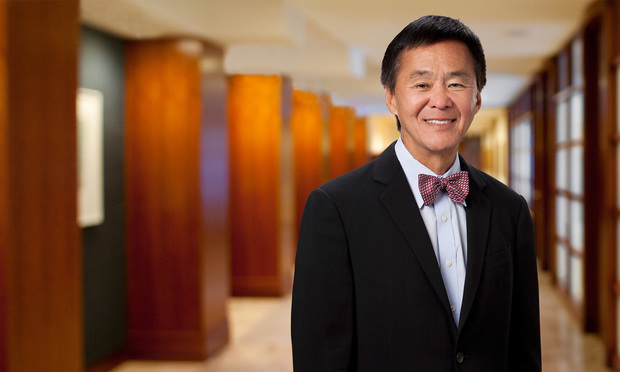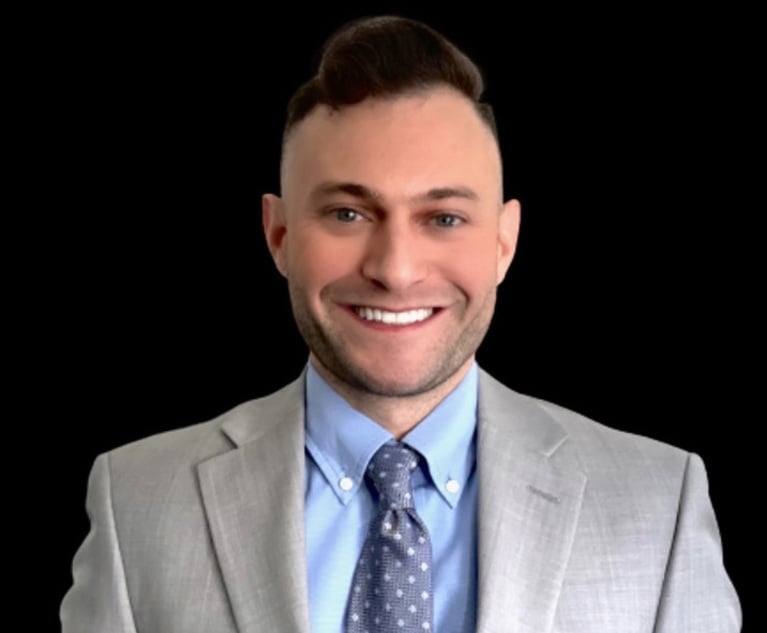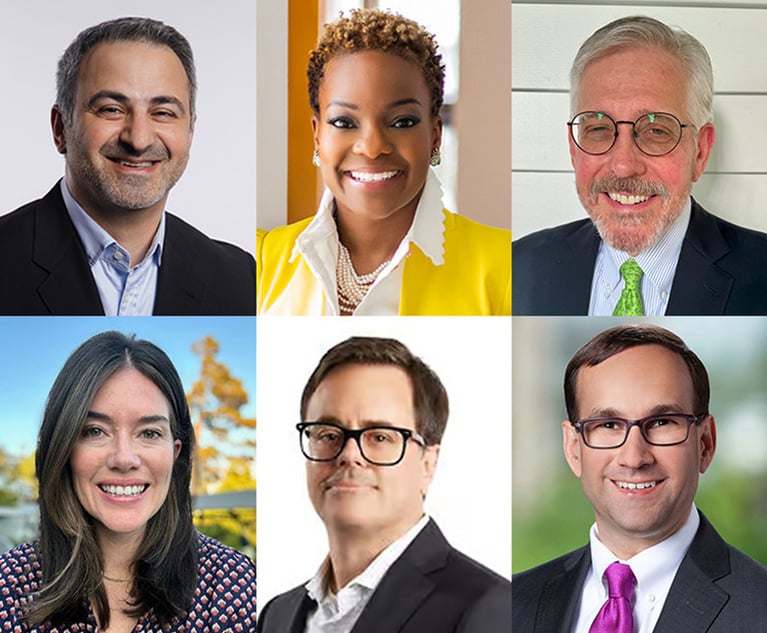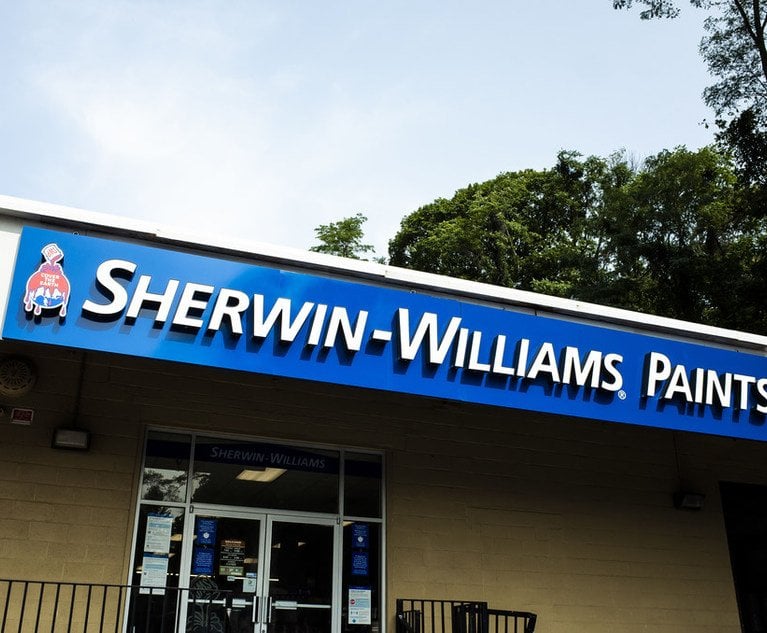Supreme Court Will Decide if USPTO Can Collect Legal Fees
The U.S. Patent and Trademark Office did not go after attorneys' fees in special district court proceedings for more than a century but recently changed its policy.
March 04, 2019 at 10:18 PM
3 minute read
 Morgan Chu of Irell & Manella (Courtesy photo)
Morgan Chu of Irell & Manella (Courtesy photo)The U.S. Supreme Court agreed Monday to hear a dispute over attorneys fees between the U.S. Patent and Trademark Office and a company led by billionaire Patrick Soon-Shiong.
Iancu v. NantKwest is an appeal from the PTO after the U.S. Court of Appeals for the Federal Circuit refused en banc to award the office its fees in litigation with immunotherapy company NantKwest.
After being denied a patent, NantKwest initiated what's known as a Section 145 proceeding in district court to try to force the PTO to issue it. Section 145 of the Patent Act provides that “all the expenses of the proceedings shall be paid by the applicant,” regardless of outcome.
NantKwest lost the suit, and the PTO moved for $78,592 in attorneys fees and $33,103 in expert fees. The PTO did not seek attorneys fees for more than 100 years but says it changed its policy after the Supreme Court in 2012 broadened the kinds of evidence and discovery that can be introduced in 145 proceedings. The agency argues that the expansive “all the expenses” language is broad enough to cover attorneys fees.
The Federal Circuit disagreed in a 7-4 en banc ruling. Judge Kara Stoll wrote that the Supreme Court has generally applied the American Rule and allowed fee shifting only when Congress explicitly provides for it. “All the expenses” doesn't meet that standard, she concluded.
The PTO and the Justice Department argued in their petition for cert that the Fourth Circuit has awarded fees in a Section 145 appeal. The filing included U.S. Solicitor General Noel Francisco and Assistant Attorney General Jody Hunt, who heads the Civil Division.
NantKwest is represented by an Irell & Manella team led by partner Morgan Chu. “'Fees' are never mentioned” in the statute, Chu wrote in opposition, “let alone 'attorneys' fees' or any other equivalent that would suggest that such fees are recoupable.”
Section 145 proceedings are fairly rare, but two academics who follow Federal Circuit law said they weren't entirely surprised the Supreme Court took the case.
Emory University law professor Timothy Holbrook said that, whenever the solicitor general's office signs on to a PTO cert petition, the odds of the court granting cert go up.
Villanova University law professor Michael Risch said the close vote at the Federal Circuit could have gotten the court's attention, and the justices might be on the lookout for some noncontroversial decisions to counter the potential blockbusters in the offing with the arrival of Brett Kavanaugh.
Risch also suggested the court might use the case to examine whether “expenses” should be narrowed to exclude not only attorneys' fees but expert witness fees as well. “Similarly, the law is unsettled about whether in-house counsel can even collect in fee shifting cases,” he said via email. “As far as I can tell, the Federal Circuit doesn't even address that question (though the dissent does).”
This content has been archived. It is available through our partners, LexisNexis® and Bloomberg Law.
To view this content, please continue to their sites.
Not a Lexis Subscriber?
Subscribe Now
Not a Bloomberg Law Subscriber?
Subscribe Now
NOT FOR REPRINT
© 2025 ALM Global, LLC, All Rights Reserved. Request academic re-use from www.copyright.com. All other uses, submit a request to [email protected]. For more information visit Asset & Logo Licensing.
You Might Like
View All
'Pull Back the Curtain': Ex-NFL Players Seek Discovery in Lawsuit Over League's Disability Plan

'Be Comfortable Being Uncomfortable': Pearls of Wisdom From 2024 GC Q&As


Insurers Dodge Sherwin-Williams' Claim for $102M Lead Paint Abatement Payment, State High Court Rules
Trending Stories
- 1'A Death Sentence for TikTok'?: Litigators and Experts Weigh Impact of Potential Ban on Creators and Data Privacy
- 2Bribery Case Against Former Lt. Gov. Brian Benjamin Is Dropped
- 3‘Extremely Disturbing’: AI Firms Face Class Action by ‘Taskers’ Exposed to Traumatic Content
- 4State Appeals Court Revives BraunHagey Lawsuit Alleging $4.2M Unlawful Wire to China
- 5Invoking Trump, AG Bonta Reminds Lawyers of Duties to Noncitizens in Plea Dealing
Who Got The Work
J. Brugh Lower of Gibbons has entered an appearance for industrial equipment supplier Devco Corporation in a pending trademark infringement lawsuit. The suit, accusing the defendant of selling knock-off Graco products, was filed Dec. 18 in New Jersey District Court by Rivkin Radler on behalf of Graco Inc. and Graco Minnesota. The case, assigned to U.S. District Judge Zahid N. Quraishi, is 3:24-cv-11294, Graco Inc. et al v. Devco Corporation.
Who Got The Work
Rebecca Maller-Stein and Kent A. Yalowitz of Arnold & Porter Kaye Scholer have entered their appearances for Hanaco Venture Capital and its executives, Lior Prosor and David Frankel, in a pending securities lawsuit. The action, filed on Dec. 24 in New York Southern District Court by Zell, Aron & Co. on behalf of Goldeneye Advisors, accuses the defendants of negligently and fraudulently managing the plaintiff's $1 million investment. The case, assigned to U.S. District Judge Vernon S. Broderick, is 1:24-cv-09918, Goldeneye Advisors, LLC v. Hanaco Venture Capital, Ltd. et al.
Who Got The Work
Attorneys from A&O Shearman has stepped in as defense counsel for Toronto-Dominion Bank and other defendants in a pending securities class action. The suit, filed Dec. 11 in New York Southern District Court by Bleichmar Fonti & Auld, accuses the defendants of concealing the bank's 'pervasive' deficiencies in regards to its compliance with the Bank Secrecy Act and the quality of its anti-money laundering controls. The case, assigned to U.S. District Judge Arun Subramanian, is 1:24-cv-09445, Gonzalez v. The Toronto-Dominion Bank et al.
Who Got The Work
Crown Castle International, a Pennsylvania company providing shared communications infrastructure, has turned to Luke D. Wolf of Gordon Rees Scully Mansukhani to fend off a pending breach-of-contract lawsuit. The court action, filed Nov. 25 in Michigan Eastern District Court by Hooper Hathaway PC on behalf of The Town Residences LLC, accuses Crown Castle of failing to transfer approximately $30,000 in utility payments from T-Mobile in breach of a roof-top lease and assignment agreement. The case, assigned to U.S. District Judge Susan K. Declercq, is 2:24-cv-13131, The Town Residences LLC v. T-Mobile US, Inc. et al.
Who Got The Work
Wilfred P. Coronato and Daniel M. Schwartz of McCarter & English have stepped in as defense counsel to Electrolux Home Products Inc. in a pending product liability lawsuit. The court action, filed Nov. 26 in New York Eastern District Court by Poulos Lopiccolo PC and Nagel Rice LLP on behalf of David Stern, alleges that the defendant's refrigerators’ drawers and shelving repeatedly break and fall apart within months after purchase. The case, assigned to U.S. District Judge Joan M. Azrack, is 2:24-cv-08204, Stern v. Electrolux Home Products, Inc.
Featured Firms
Law Offices of Gary Martin Hays & Associates, P.C.
(470) 294-1674
Law Offices of Mark E. Salomone
(857) 444-6468
Smith & Hassler
(713) 739-1250






